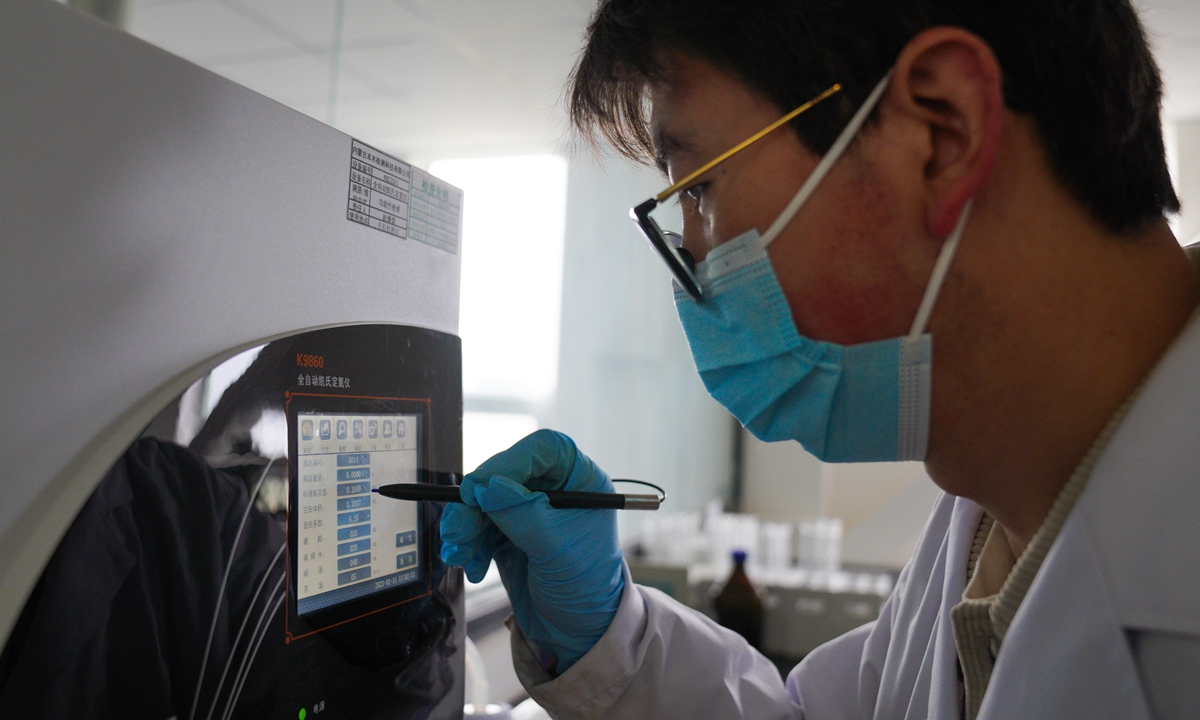
Basic research Photo: VCG
China's top leadership has stressed, twice over the past month or so, making efforts to achieve self-reliance and strength in science and technology, reflecting the great importance that's attached to the country's science and technology development amid increasingly fierce global competition as well as the US' relentless push for a so-called technology decoupling.
On Tuesday, the Political Bureau of the 20th Communist Party of China (CPC) Central Committee held a study session on effectively strengthening basic research and consolidating the foundation of self-reliance and self-improvement in science and technology, the Xinhua News Agency reported on Wednesday.
While chairing the study session, Xi Jinping, general secretary of the CPC Central Committee, urged the strengthening of basic research so as to consolidate self-reliance and strength in science and technology, according to Xinhua. Xi also noted that strengthening basic research is an urgent requirement to achieve greater self-reliance and strength in science and technology, and it is the only way to build a world leader in science and technology.
This comes less than one month after the Political Bureau of the 20th CPC Central Committee held, on January 31, a group study session on accelerating the establishment of a new pattern of development. During the session, Xi also stressed that it is imperative to move faster toward self-reliance in science and technology so as to relieve the stranglehold some countries have tightened on China's development of core technologies.
During the study session on Tuesday, Xi also noted the shift of global technological competition toward basic research and called for various efforts to strengthen basic research and solve key technology problems from the source, according to Xinhua. Specifically, Xi called for the strengthening of the forward-looking, strategic and systematic layout of basic research, deepening reform of basic research system and mechanism and building a systemic, high-level platform for talent training.
The top leadership's focus on technology self-reliance underscores China's resolve to not only tackle issues in science and technology advancement, including foreign technological blockade, but also become a world leader in science and technology, researchers and analysts said on Wednesday. The focus on basic research is of great significance in terms of tackling bottleneck issues, they noted.
"What this signals is that the nation will improve its science and technology independence from the aspect of basic science and technology," Sun Yuzhong, a researcher at the Institute of Computing Technology at the Chinese Academy of Sciences, told the Global Times on Wednesday.
Sun further noted that the US' technological blockade has become almost "crazy," and external political pressure has brought great challenges to China's basic research. "So we have to build more completely independent basic scientific research capabilities and facilities," Sun said.
The US has waged a multifaceted campaign against China's scientific and technology development in recent years with moves such as banning the export of advanced technological components to China. In the latest moves, the US is banning the sale of chip-making equipment to Chinese firms.
China has been making great strides in terms of technological application in recent years thanks to its vast market, but, when it comes to basic technological capabilities, more needs to be done, as the US is trying to contain China's technological rise, said Fang Xingdong, founder of Beijing-based technology think tank ChinaLabs.
Steady rise
While China is still falling behind the US in certain areas such as research equipment used in hospitals and research institutions, the country has also seen steady improvement in its basic research capabilities and scale, researchers and analysts noted.
In 2022, China's gross domestic expenditure on research and development (R&D) reached 3.09 trillion yuan ($449 billion), exceeding the 3 trillion-yuan mark for the first time ever, according to official data released on Monday. Among them, spending on basic research reached 195.1 billion yuan in 2022, 3.9 times higher than in 2012, accounting for 6.32 percent of the total annual R&D expenditure.
While China's spending on basic research is growing steadily, its proportion in total R&D expenditure is lower than that of the US, whose basic research spending makes up about 15 percent of the total R&D expenditure despite a declining trend, according to analysts and official data.
"It takes a long time to build up basic research capabilities, but with greater policy support comes greater efforts and faster speed in strengthening basic research," Fang told the Global Times on Wednesday, noting that Chinese firms should also be encouraged to play a bigger role in building up the nation's basic research capabilities.
Apart from national laboratories, research institutions and universities, the increasing number of leading technology companies in China are also great assets to the country's effort to bolster basic research, analysts noted. At the end of 2021, there were 330,000 high-tech companies in China, up from 49,000 in 2012, latest official data showed. More than 680 companies listed among the world's top 2,500 R&D spenders in 2021.
Many leading tech companies have been in recent years stepping up spending on supporting basic research. For example, internet giant Tencent announced last year that it would launch the New Cornerstone Investigator Program, through which it pledged to provide 10 billion yuan ($1.45 billion)over 10 years to support leading scientists to spearhead basic research. The first group of 58 scientists in the areas of mathematics and physical sciences as well as biological and biomedical sciences have been selected for the program, Tencent said in a statement sent to the Global Times on Wednesday.
Such a program "gives a full play to the unique advantages of social funds… will help scientists to open up new directions, propose new concepts, new theories, and stimulate new paradigms of scientific research," Gong Qihuang, an academician of the Chinese Academy of Sciences and president of Peking University, was quoted in the Tencent statement as saying.




